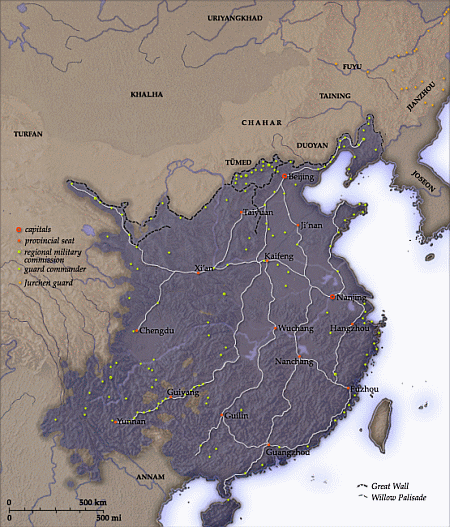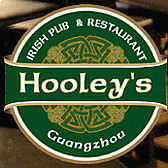|
|
| Chinese
History |
Imperial
China - Ming
|
|
Ming (1368 –
1644)
After the demise of the Mongols, the Ming Dynasty
reinvented China; bringing with them culture, arts and
excellence of skills and thinking. Your treasured china
may be named after this Dynasty?
The Ming had a large standing army of between 1 million
and 2 million troops, as well as a large and active
Navy. They wished to enlarge the Empire, and ruled over
Vietnam for several decades. They also looked to the
West, but made no significant territorial gains.
They continued to protect their Northern borders for
attack, especially from the Mongols and Jurchen Jin.
The mongols in particular harried China from 1449, and
a century later even reached the gates of Beijing before
being repelled. The Great Wall was extended and repaired,
and what you see today is of Ming construction. The
brick and granite work was enlarged, the watch towers
were redesigned, and cannons were placed along its length.
The East coast had to be protected also, this time from
Japanese pirates, hence the Great Wall even extended
into the sea in certain places

Map courtesy of Wikipedia
http://en.wikipedia.org/wiki/History_of_China#Ming_Dynasty
In a major shift away from the policies of previous
Empires, the Ming shifted the interest away from foreign
trade, and instead focused upon the land and taxation.
Land became the property of the Emperor, and large estates
were broken up - thus removing many wealthy landowners
and preventing the Warlord threat from arising again
in the future. Land was rented out to peasants, and
slavery was abolished. This led to flourishing private
enterprise, and with it came markets to towns all over
China
So far so good then! However, the administration of
the Empire became a large factor in daily Ming life,
taking up much of the Emperors time. A large bureaucracy
was created, which generated much paperwork; and in
later times, so unwieldy that is led to the Empire's
eventual demise. The Ming became so caught up in their
bureaucracy that they were unable to adapt to the changing
social environment. Before this they did some remarkable
things, like inventing the moveable type printing press,
which was honed over years, and used first wooden, then
brass, and finally ceramic die which were created by
the Emperor himself.
Trade was important to the Ming, and whilst some trade
filtered through the Silk Roads, it was not as before,
and not under Chinese control except via Guangzhou.
In the far Southeast trade was fully exploited, and
The Pearl River became the centre of Ming overseas commerce.
Otherwise and further North, most trade was with the
Japanese - hence the pirates no doubt. The Grand Canal
was overhauled with the direct result that trade improved,
especially in relation to iron. The route of the Canal
in Beijing was altered to allow better trade, and this
required a new water source - that was achieved with
great ingenuity. The Forbidden City was also extended,
and is what you see today (Except for later French looting)
However, the Ming did look outside their immediate borders,
and Zheng He assembles a fleet and sails the known world.
Trading relationships are established with Southeast
Asia, India, East African States and Chinese control
reaches as far as Turkestan.. China is 'Open' during
the beginning of this Dynasty, but later it becomes
more paranoid and 'Closed'. A great shame really, as
the voyages of Zheng He were starting to show great
rewards
Whilst famine was not a problem, the Shaanxi earthquake
of 1556 that killed approximately 830,000 people was
a terrible disaster. However, unlike their Yuan predecessors,
the Ming Emperor Qi Jiguang rose to the task. He also
finally put an end to the Japanese pirates
Things started to go wrong during the reign of Emperor
Wanli (r. 1572–1620). At first he was very dutiful,
but constant bickering and harassment by his senior
official led to him withdrawing from public life - of
which he was the centre of course. Therefore it came
to pass that the civil servants had to communicate with
him via eunuchs. The Eunuchs rose in power, and were
granted rights and privileges above those of the civil
servants, even to the extent of collecting provincial
taxes. By the end of his reign, the eunuch Wei Zhongshan
was virtually ruling by proxy. Wanli was succeeded by
Chongzhen, who immediately had Wei dismissed. However,
the eunuch problem persisted and undermined the Empire
right until the end
Also undermining the Empire were the activities of the
British, Dutch, Spanish and French. They were having
their own fights in other regions of the world, and
what was most important to them was control of Silver.
Now, Chinese economy was based on Silver, and this was
mainly imported. The imports dried up, the price of
silver rocketed, and the country ran out of cash. Ordinary
peasant use copper coins for daily trading, but had
to pay taxes in silver. Between 1630 and 1650 the price
of silver soured over 3, 000%, compared to the value
of copper. Peasants couldn't pay taxes. Unrest within
the Empire grew, and nobody had the wit to change the
internal monetary system
The final throws of Empire came with peasant rebellions
that followed: A drought, famine, flooding and plague.
Large sections of the military deserted, leaving the
Empire open to attack. The Chinese military, caught
between fruitless efforts to defeat the Manchu raiders
from the north and huge peasant revolts in the provinces,
essentially fell apart.
The Jurchen, or Jin, or Manchu as they were now called,
were simply biding their time, and gathering support
from disgruntled Chinese to the North. They finally
entered China via a gatehouse of the Eastern Great Wall,
when the gates were opened for them from within. These
Gatehouses were elaborate affairs designed for defence.
They consisted of layered areas of courtyards linked
by mazes, with high walls patrolled by soldiers to monitor
the killing grounds beneath. Not one shot was fired,
and the Manchu were escorted through. They hastened
to Beijing, were the gates also fell open to them. The
Ming Emperor hanged himself in his garden, and the Qing
Empire was born
|
|
This
information is as supplied by Wikipedia, as dated March
2009 or later, and/or other reliable sources.
Maps (Unless stated otherwise)
are provided in association with Thomas Lessman
Web: www.worldhistorymaps.info
Disclaimer:
Please check this information yourself as it may alter
without notice, and whilst we try our best to ensure
it is correct, please do not hold us responsible for
any errors - this is intended as a simple guide only |
|
| Search
this Website |
|
|
| Our
Friends |
Excellent
& Free Online Chinese Language Portal

Thousands of free print-friendly Chinese reference sheets,
tests and revision aids.
Easy Learning format &
Listen to Spoken Words |

Professional
Visa Services
Company
Formation Packages
.
|

British Foreign Office
Resource and Advice for Travellers Worldwide |

Chinese Embassy in UK
Information About China
International Relations
Visa & Consular |

UK Embassy in China
Information About UK
International Relations
Visa & Consular |

|
Excel
Education |
Languages Courses
Study Abroad
Employability
Summer Camps
Information for Teachers |
|

Excellent and relaxing base to
explore this most beautiful of regions in all China! |
Down The Road.org
How We Traded Our Ordinary Lives For a Global Bicycle Touring Adventure

See
Us in China |

Empowering Underprivileged Children
& Their Communities = Worldwide |
 |

Based in Shangri-la,
Yunnan
Province
Dedicated to Exploring Remote Areas of China
Committed to Nature Conservation and Preserving Ethnic
Cultures & Traditions
|

Based in Xi'an,
China's Premiere Travel Agency and International Travel
Community -
Committed to providing:
Best travel deals & current information for all
International Travellers |

Pearl Dragon
Vast
Online Trading and Information Resource
Link goes to Chinese Tourism and Galleries Section |
|